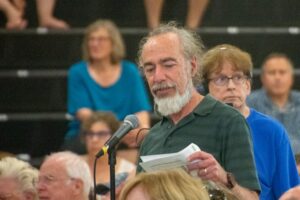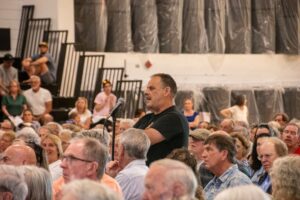EASTHAM — Voters overwhelmingly approved the construction of a sewer system around the Salt Pond watershed at the special town meeting held on Monday, June 23 at Nauset Regional High School. Of the 633 residents who filed into the gym for the discussion and vote, only 96 voted against; 537 favored the plan — far more than the two-thirds majority needed for approval.

Because the vote involved a Proposition 2½ debt exclusion, the borrowing for the sewer system also had to be approved by a simple majority at a town election. On Tuesday, residents again voted for the sewers — this time 798 to 141.
At $170 million, the wastewater system is the most expensive project in Eastham’s history. The work will be partially financed with a low-interest loan from the State Revolving Fund (SRF), which the town had until the end of this month to accept.
According to Town Manager Jacqui Beebe, construction is expected to begin in fall 2026, with the system likely operational in 2030. The waste treatment plant will be built at the back of the town DPW site; the network of sewers will serve 786 parcels around Salt Pond, Ministers Pond, and Route 6 as far north as Nauset Road.
The plant’s designer will be required to guarantee a lifespan of 30 years or more, said Ziad Kary, a consultant with APEX Companies who has been working with the town to develop the wastewater project. Kary said that approximately 143,000 gallons of water would flow through the system every day — with that number increasing dramatically during the summer.
“The technology is state-of-the-art,” Beebe said. “That’s why we’re paying so much money for it.” The plan is expected to add $1,000 a year to the average property tax bill.
By constructing sewers, Eastham will also be following a set of 2024 regulations from the Dept. of Environmental Protection (DEP) that require all Cape Cod towns to remove nitrogen from estuaries like Salt Pond.

The only DEP-approved alternative to a municipal sewer system as outlined in this year’s special town meeting warrant was for every property owner to install an Innovative/Alternative (I/A) septic system. That’s the route the town of Wellfleet chose — but Eastham town officials criticized it as far too expensive.
“I’d rather not pay $30,000 or $40,000 thousand for an I/A system,” said Tom McNellis, chair of the town’s energy and climate action committee. “I think this is a good decision.”
Finance committee co-chair Mary Shaw framed the measure as a chance for voters to learn from their decision not to support a municipal water system back in 2007, when a $76-million proposal failed to pass at that year’s annual town meeting. In 2014 and 2015, voters approved a similar project for $130.8 million. Shaw stressed that the eight-year delay had added $54.8 million to the cost of that project.
“We are currently paying the price for short-sighted decisions,” Shaw said. She said voting against the sewer system “would be financially irresponsible.”
Mary Nee echoed Shaw’s concerns about the cost of delay: she said she had encountered a similar situation as one of Boston’s sewer commissioners during the 1980s, when delays doubled the cost of a secondary sewer system from $2 billion to $4 billion.
“A centralized wastewater system is not an ‘if’ but a ‘when,’ ” Nee said. She urged those in attendance to vote “yes.”
Conservation commission chair Karen Strauss also spoke in favor of the article, saying that “the nutrient problem in our waterways won’t solve itself” and that “recovery only begins after we act.”
Voters’ Concerns
In the weeks leading to the special town meeting, yard signs had appeared around town criticizing the sewer plan as “overdevelopment.” While no voters explicitly raised that concern during the meeting, Director of Health and Environment Hillary Greenberg-Lemos characterized the plan as “growth-neutral,” meaning that it won’t increase the amount of development allowed on each lot in town.

But there were plenty of other reasons voters gave for being skeptical.
Planning board chair Dan Coppelman offered a series of questions to town officials, most of which concerned the treatment facility’s proximity to one of Eastham’s three public water supply wells. “It’s a well-known fact that there’s a myriad of chemicals present in wastewater,” he said. “What is the rationale in discharging unidentified elements into or near the aquifer?”
Beebe said that she was committed to the safety of the town’s wells and that a municipal sewer system was the best way to protect them.
“Right now, we’re putting our waste into our back yards,” Beebe said. “It gets no treatment. It sits there, and then it goes into the environment. A centralized treatment system is a far better way to protect against those contaminants.”
Assistant Town Manager Rich Bienvenue added that a municipal treatment system would help the town comply with future DEP regulations. “If we need to do PFAS removal, we can make an upgrade to our centralized treatment system,” he said. “You can’t efficiently do that when you have thousands of systems throughout the town.”
Nancy Benben complained that the proposed treatment plant wouldn’t have the capacity to serve the entire town. She also questioned the estimated $1,000 property tax increase and asked Bienvenue to tell the meeting how much property taxes had gone up over the past five years.
Eric Radke also criticized the potential cost of the project, asking Beebe and Bienvenue if “expensive things” like tanks would need to be replaced in the plant. Beebe said the town would do regular maintenance on the system so parts wouldn’t have to be replaced until much later.
Bienvenue said that the town’s capital budget accounted for maintenance and repair. He also said that any replacements would likely take place 20 to 40 years in the future, after the original debt from construction had expired.
“Done with one debt and into another — perfect!” Radke said.
Stacey Richardson wondered if another opportunity for a low-interest, automatically renewing SRF loan might be available in later years. “Maybe in two or three years, when we decide we still want to do it, there will,” she began, but she was cut off by jeering.
Ian Drake called the question to a vote, saying that he thought “everybody’s mind is pretty much made up.” His motion passed 575 to 47 — and the tension in the auditorium momentarily subsided as most agreed it was time for the meeting to end.
When Town Moderator Scott Kerry declared that the article had passed, many voters began to cheer. Some seemed pleasantly surprised at the wide margin.



